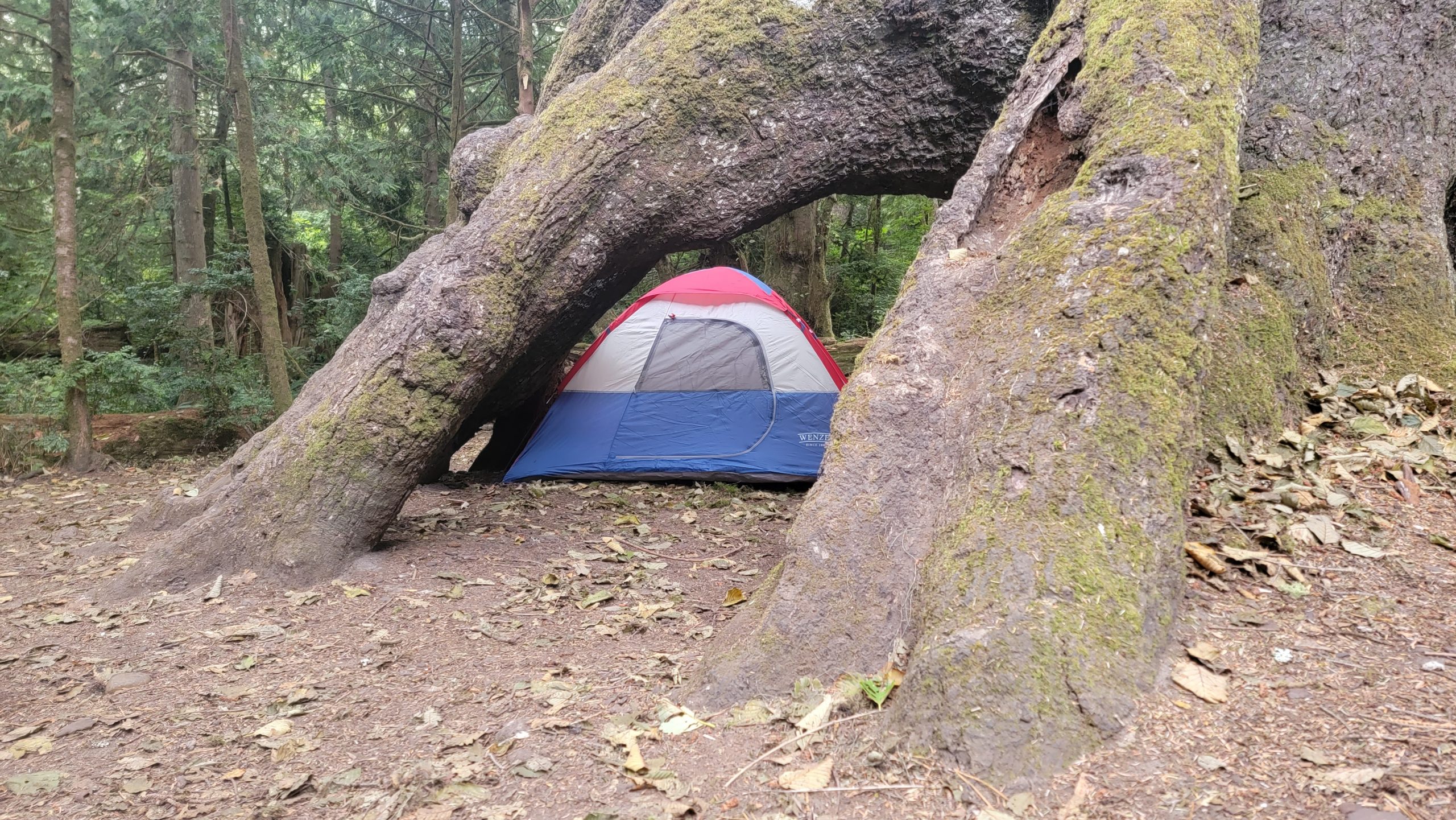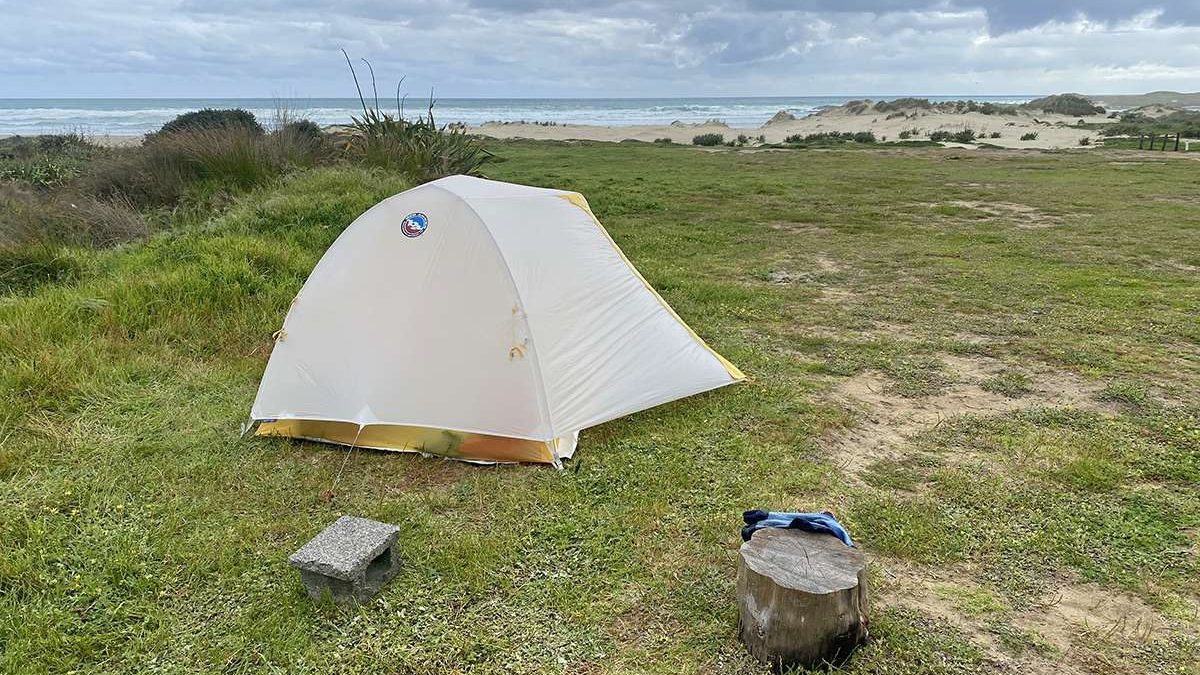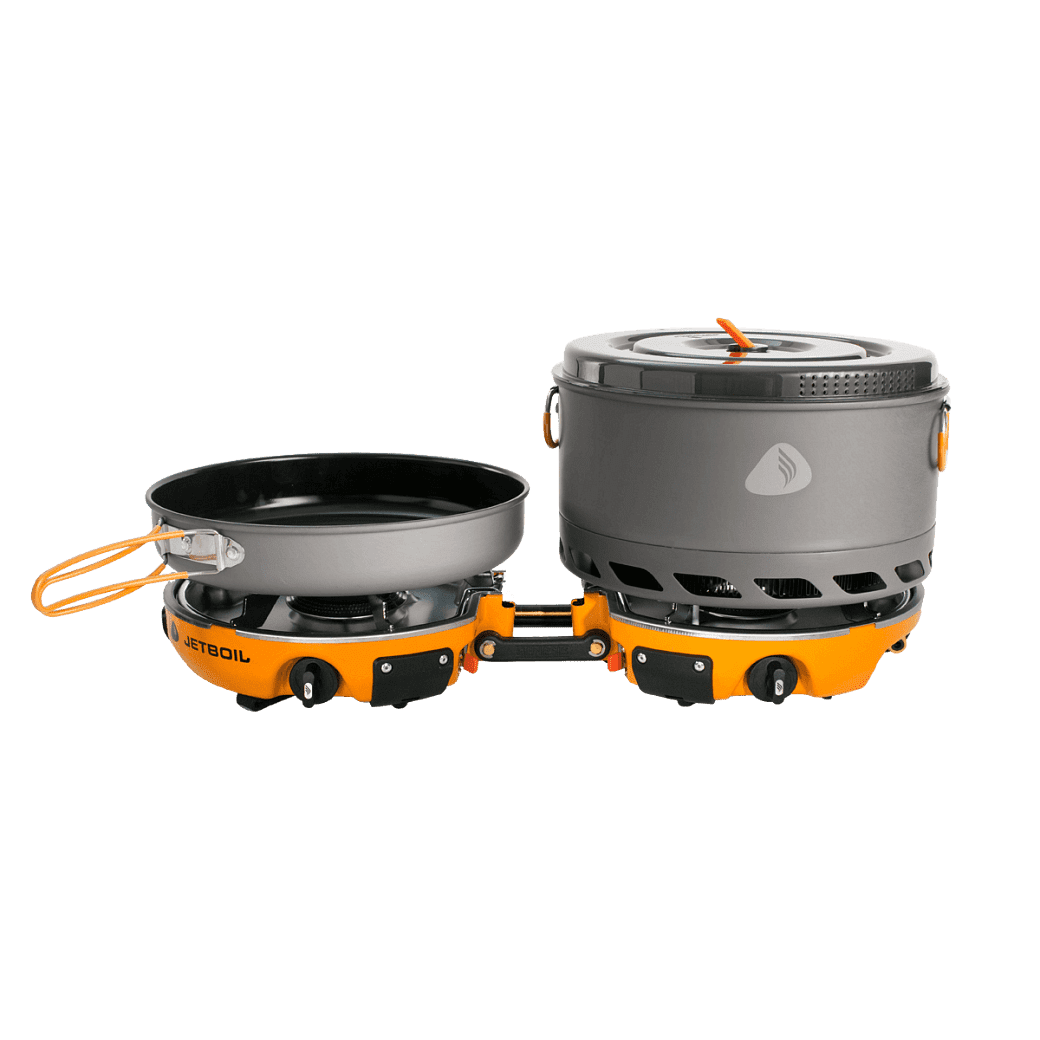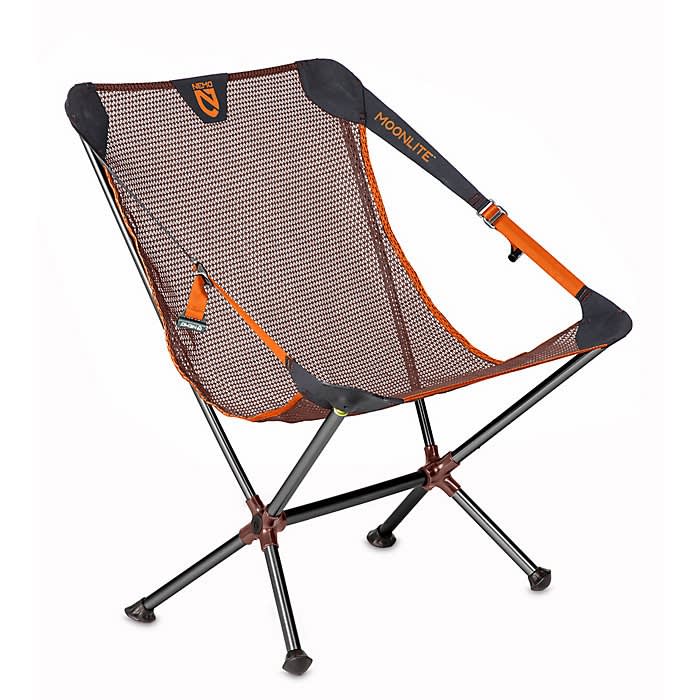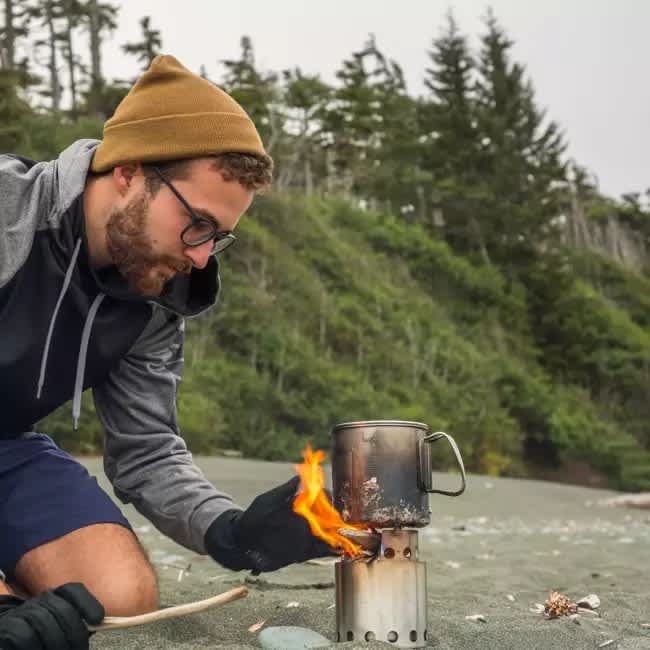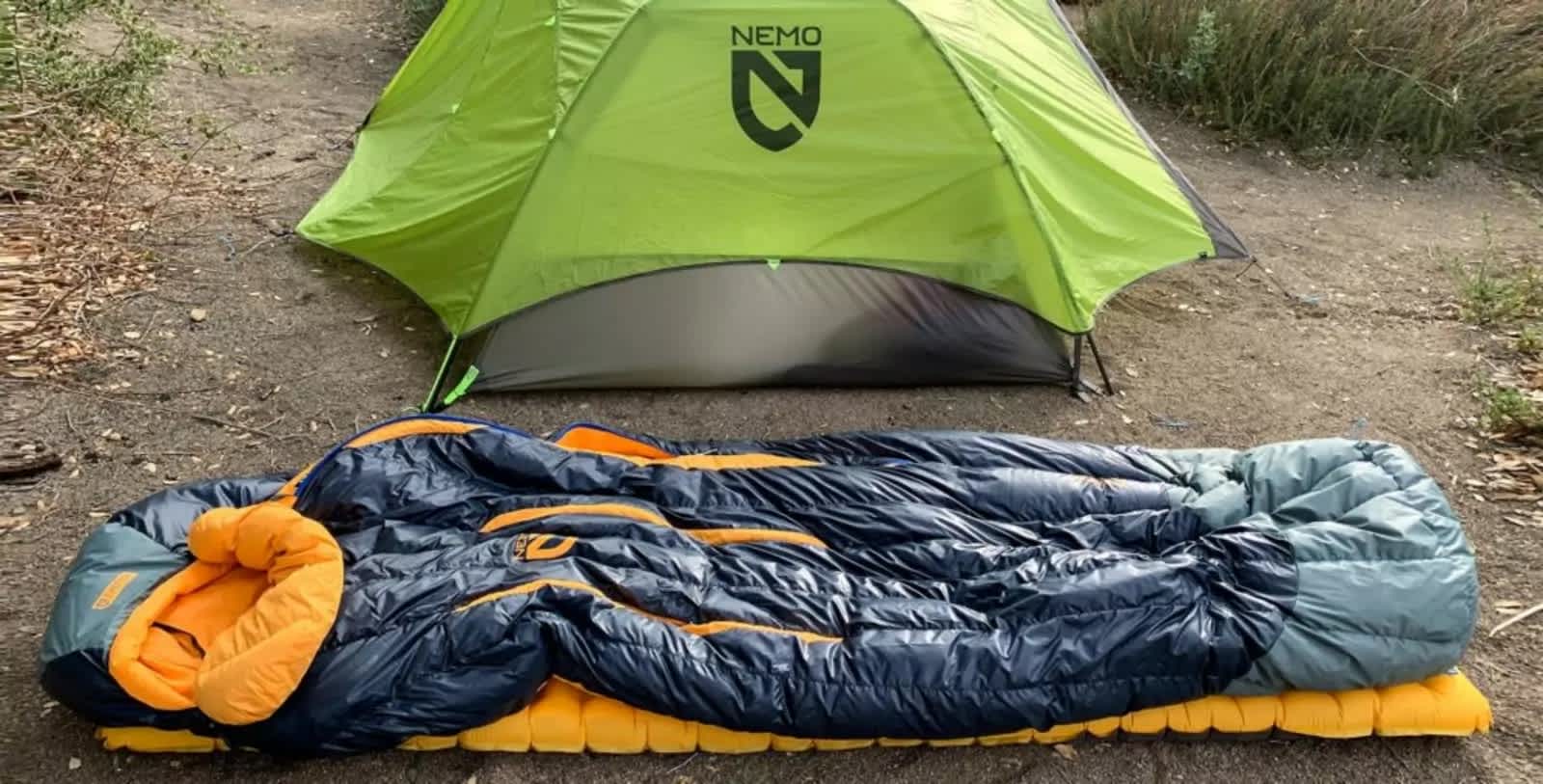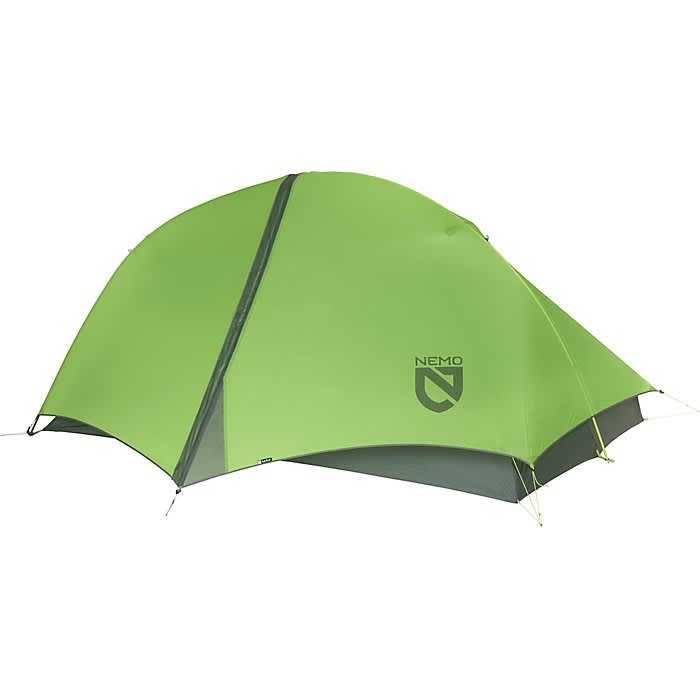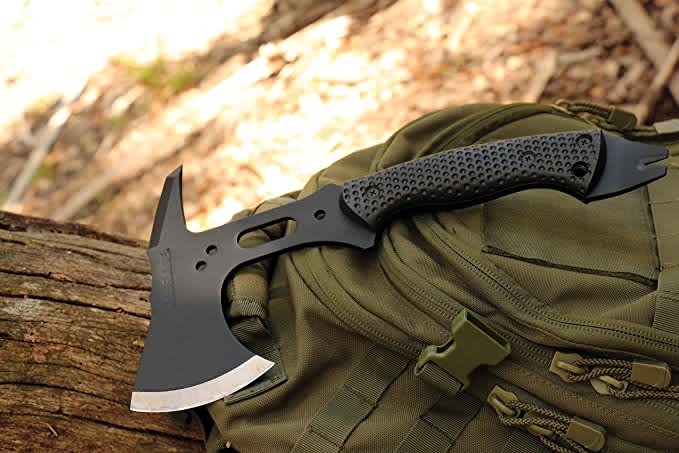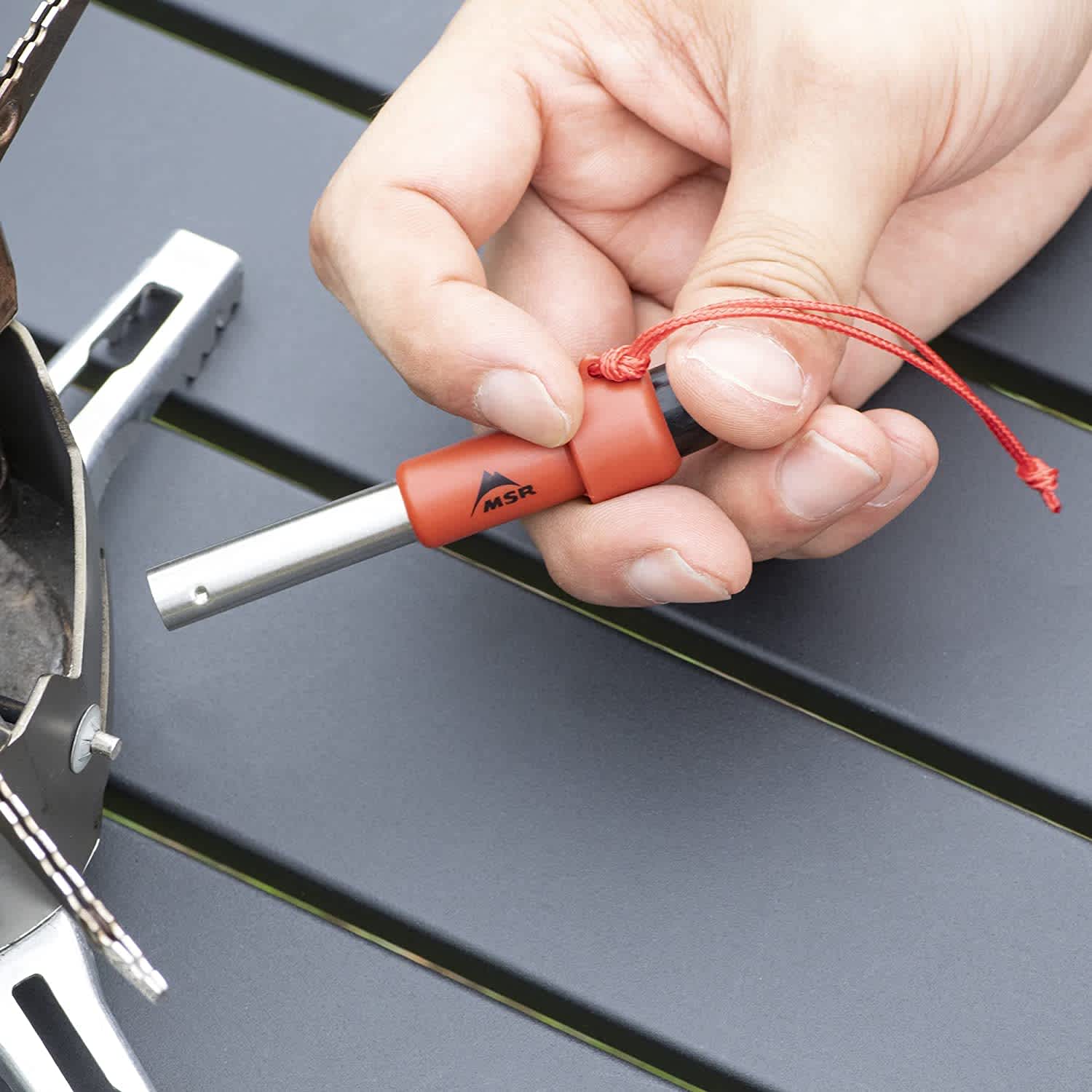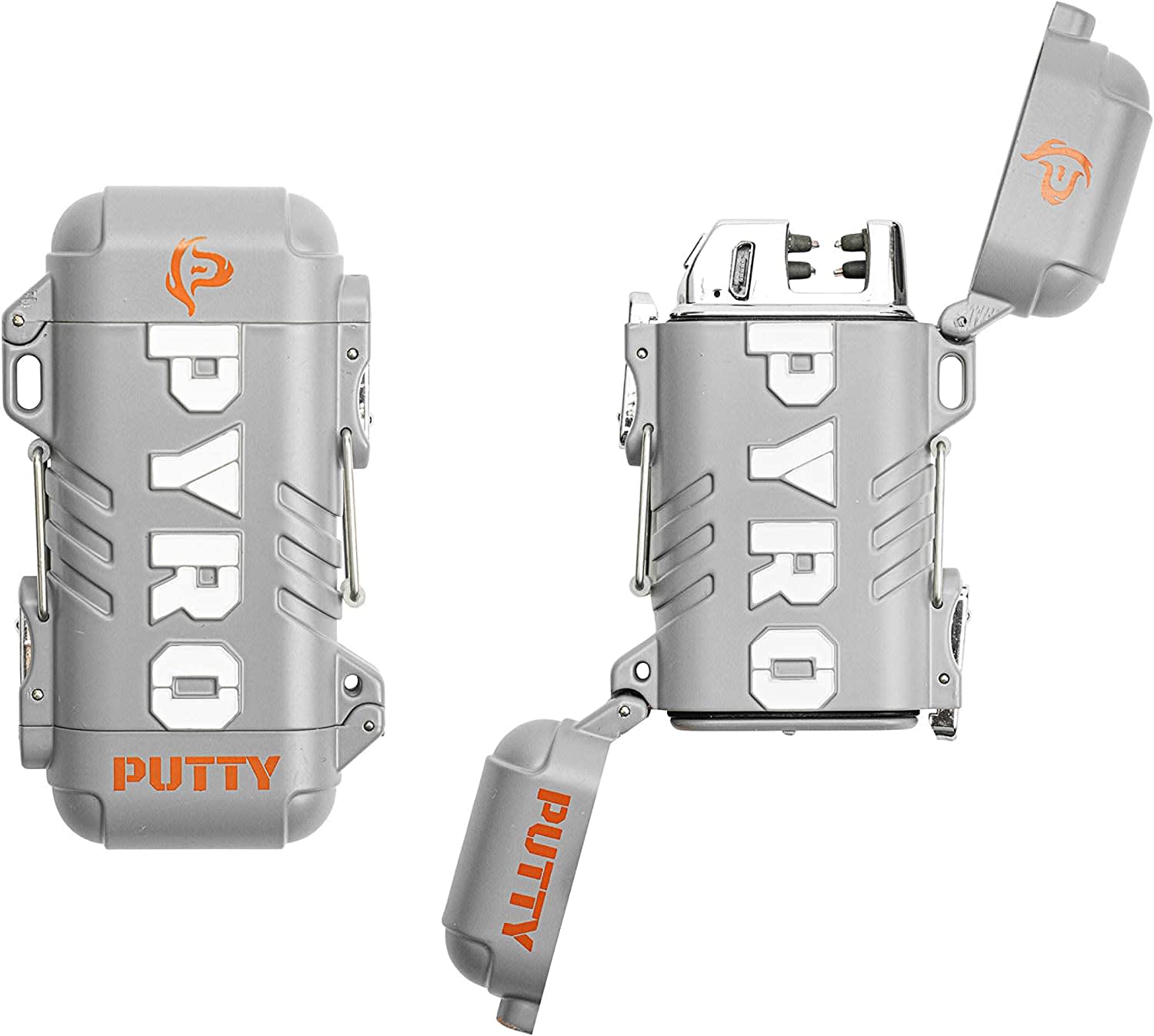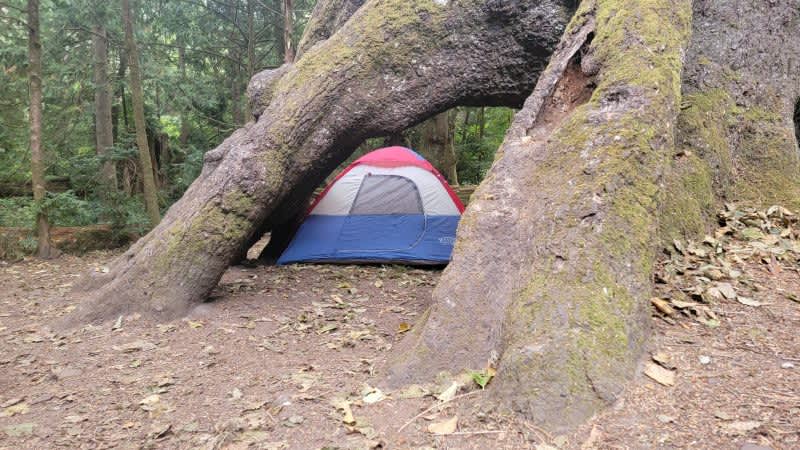
+
–
Table of Contents
1. The Jetboil Genesis Basecamp System
While it’s a little on the heavy side (weighs about 10 pounds) the Jetboil Genesis Basecamp system is probably one of the most durable, reliable, and well-equipped camp stove steups you can pick up at just about any online retailer or big box store. The Genesis Basecamp System is the ultimate all-in-one backcountry cooking system, stowing neatly into itself and fitting snugly among your gear. Jetboil’s dual-burner design functions as a standalone stove, or couples with other Jetlink-compatible stoves or a Luna satellite burner to create an outdoor cooking range. The system’s 5-liter Jetboil FluxPot and 10-inch ceramic-coated nonstick fry pan give you everything you need to set a new benchmark for basecamp cooking. A beastly 10,000 BTU heating system boils water in just over three minutes—perfect for melting snow or making coffee. An attachable windscreen improves the system’s performance in any weather; regulated for consistent performance down to 20 degrees F
Pros/Great Performance, Durablity and all-weather/all-season compatiblity
Cons/Quite heavy and expensive. not great if you’re hiking to your camping destination or you’re on a budget.
Bottom Line/As the name implies, the Genesis Basecamp system is great for whipping up a nice hot meal at your established camp site.
2. NEMO Moonlite Reclining Chair
The Nemo Moonlite Reclining Chair is an ultralight chair for sitting in the outdoors. Carry it into the backcountry if you wish, at just under two pounds, it’s not only possible, but incredibly comfortable to sit on once you get there. The aluminum frame and polyester fabric can handle a 300 lb capacity and has an adjustable seating position. Sit up for dinner, lean back a touch once you are full and then when the stars come out, adjust once more back and you’re fully relaxing.
FEATURES OF THE NEMO MOONLITE RECLINING CHAIR
- Lean forward or kick back and relax
- Reclining system for multi-position sitting experience like its siblings in the Stargaze family
- Seamless construction of the seat is made possible by custom engineered mesh that conforms to body when sit
Fabric Details
- 7001 Aluminum Frame, 6061 Hubs
- 100% PCR Mesh, Edge Binding, Webbing
Pros/Reclines both forward and rearward making it much easier to get in and out of the chair – lightweight mesh so it won’t hold water or moisture in the seat.
Cons/Not really the most comfortable chair out there
Bottom Line/A great camping or even hiking chair due to its excellent combination of features, and construction materials.
3. Solostove Lite
The camp stove that started it all. Lightweight, compact, and innovative design makes Lite the solo explorer’s essential. Lite lets you turn good moments at the campsite into lasting memories.Craft a delicious meal and bask in the glow of a mesmerizing flame all with one portable camp stove. Lite’s ultra-efficient burn brings just twigs and kindling to brilliant flames in minutes. Start up isn’t just fast, it’s easy. Exceptional airflow does the heavy lifting so even a novice can boil water in less than 10 minutes. Lite’s unique engineering is the blueprint for our famous smokeless fire pits. The double-walled design and superior airflow make for a flame so hot, smoke is consumed by the heat.
Pros/A durable camp stove option that lets you save room on fuel by using regular sticks found in the wild
Cons/Cook times are less efficient and there is a significnat cool down time before stowage
Bottom Line/A great option for those looking to save on weight, bulk and extra supplies
4. NEMO Equipment Disco 15 3-Season Sleeping Bag
he NEMO Men’s Disco 15 Sleeping Bag is a lightweight down sleeping bag designed for 3-season backpacking. The classic Spoon shape is nice and roomy around the elbows and knees, providing extra wiggle room and comfort for side sleepers, back sleepers, and any other kind of sleeper. The 650-fill down and shell fabric feature a water-repellent treatment for enhanced performance in wet or humid conditions. Thermo Gills on top give you a quick way to vent excess heat during the night, and the built-in pillow pocket keeps a camp pillow, puffy jacket, or wad of clothing positioned where you want it.
Pros/Vented design makes this sleeping bag great for camping virtually any time of the year.
Cons/While its fairly small when its packed up, the bag is still kind of heavy which might not be optimal for long backcountry hiking
Bottom Line/A great 3-season bag that should suit you for almost any time of the year!
5. NEMO Hornet 2P Tent
The NEMO Hornet 2P Tent is an excellent lightweight option for any kind of camping especially when combined with the NEMO Disco 15 sleeping bags. The NEMO Hornet 2P Tent is a shelter for the backcountry. Hike through the day and when it’s time to set up camp the 2 person tent is ready to protect against bugs and shield from wind and rain. The white mesh offers privacy while the black mesh allows for stargazing at night. A door and vestibule for each person won’t cramp your own personal style, enter and exit without bothering your partner.
Pros/Great forward thinking desgin that optimizes for weight, and weather resistance.
Cons/A little small for two people with gear but not a huge deal if you’re comfortable with one another
Bottom Line/A great backpacking option especially since the load of the tent can be split beetween two people for easier transport!
6. Schrade SCAXE5 12.8in Full Tang Tactical Hatchet
For the price and performance you get out of it, the Schrade SCAXE5 is one of the best camping and hiking hatchets out there. The axe features a full tang powder-coated SK5 High Carbon steel head, with a glass-filled nylon fiber handle for better comfort, grip, and cutting power for the miniature 2-pound axe. The SCAXE5 loses a few points for not having a hammer on the opposite side of the axe head but most of the time you can bash your camp stakes in with a handy rock – courtesy of mother nature.
Pros/Compact, dense, and extremely durable and comfortable to use.
Cons/Despite its weight, its suprisingly lacking a flat hammer head – a common feature on most camp hatchets
Bottom Line/A great lightweight option for general camping duty or even emergencies.
7. MSR Piezo Ignitor
The MSR Piezo Igniter reliably lights most canister stoves with push-button convenience. The ignition element is protected inside the igniter’s tube making it far more reliable than stove-mounted igniters and the tube also collects a small amount of gas further aiding ignition.
Features:
- Durable: Un-mounted design and recessed protected element deliver excellent durability and reliability
- Consistent: Tube collects gas around element for consistent ignition
- Versatile: Designed to work with most canister stoves (Not compatible with the Reactor® stove or other radiant burners)
- Weight: 0.5 oz.
Pros/A great compact way to ignite your camp stove or pyro putty
Cons/Alomst completely useless for natural fuels
Bottom Line/Optmized for the backpacker or camper who uses a camp stove.
8. PYRO Putty ARC Lighter
While strikers and fire steels are a fool-proof way to have a reliable ignition source for campfires and camp stoves, sometimes they don’t always work the best when dealing with less-than-optimal fuel sources – especially in windy conditions. The Dual ARC plasma lighter is a fully waterproof USB rechargeable arc lighter that can store a small 0.5oz can of blue pyro putty which is an excellent way to get fires started especially in wet areas of the country like the pacific northwest. The onboard rechargeable battery has up to 300 strikes per charge and the lighter even has a low battery indicator so you know when to throw it on the solar charger.
Pros/An all-in-one fire starting solution that is weatherproof
Cons/Requires recharging every once and awhile
Bottom Line/Affordable enough and small enough to toss in your backpacking/hiking equipment along with your flint and steel.
Camping is already expensive enough. Where can I go camping for free?
Great question! OutdoorHub writer Morgan Rogue has a great article specifically for this subject here.
It’s called boondocking. People have been doing it forever.
Essentially, you find some public land and camp there.
But how do you know what is public land?
There are a few major public lands.
- BLM
- National Forests
- Army Corps of Engineers
When we were first looking for free campsites, we went to a website called Freecampsites.net where people share places and coordinates of a specific site they found on some public land space. You can also read and leave reviews.
We used this for a while and worked out okay, but some of the reviews are very subjective. We were rolling around with a 34′ rv pulling a Jeep behind us so we were cautious about where we were going to go. However, some of the reviews would say ‘this road is so bumpy’ and we’d go on the road and it wasn’t bumpy at all. I mean, maybe a couple bumps here and there but sometimes they make it seem like it’s completely un-drivable.
However, read the reviews and take them with a grain of salt as everyones thresholds or expectations are different. When you’re first starting out, this is a great site to go on and easily find good spaces to try out.
What is a 3-season sleeping bag? Is that an optimal choice for all-year?
The 3-season category is the Goldilocks temperature range for sleeping bags. We define 3-season bags as temperatures between 15ºF to 29ºF degrees. This range is where most camping takes place. Essentially 3-season sleeping bags can get the job done and keep you warm through cold autumn and winter nights where there is no frost. If you tend to sleep a little cold then you might want to bring extra layers or opt for a heavier sleeping bag. Conversely, in the summer, 3-season sleeping bags can be quite hot but this is usually less of a problem as you can always open up vented sleeping bags or open the bag altogether to let out any excess heat.
Should I bring my own firewood if I’m not using a gas camp stove?
This depends, but for the most part, you shouldn’t be bringing foreign wood into an area it is not from. If you are going to bring your own firewood, make sure it’s not only allowed but will also not negatively impact the environment you’re camping in if left behind. Diseased wood can wreak havoc on local plantlife. Many types of wood can get used for a campfire, but some are better than others. Hardwoods such as oak, hickory, and maple are ideal because they burn hot and slow. Their slow burn means they will last longer and provide more heat than softer woods like pine or fir. In addition, hardwoods produce less smoke.
We are committed to finding, researching, and recommending the best products. We earn commissions from purchases you make using the retail links in our product reviews. Learn more about how this works.
